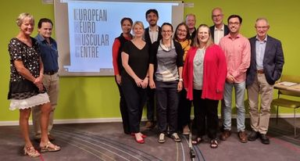Standards of care for the Dysferlinopathies
- Number 262
- Date 4 July 2022
Title: 262nd Workshop Standards of Care for the Dysferlinopathies
Organizers: Prof. Volker Straub (United Kingdom), Prof. Luca Bello (Italy), Prof. Tanya Stojkovic (France), Dr Anna Mayhew (United Kingdom)
Location: Brussels
Date 4th July 2022
Due to the COVID 19 pandemic, the workshop was initially delayed, then a series of on-line meetings took place before a one day face to face workshop in Brussels.
Online meetings: 16th July 2021; 17th December 2021; February 10th ;February 11th 2022;
March 24th 2022; May 25th 2022; June 9th 2022
Participants:
Lindsay Alfano (USA); Jorge Bevilaqua (Chile); John Bourke (UK); John W. Day (USA); Jordi Diaz Manera (UK); Sarah Shira Emmons (Patient advocacy, USA); Teresinha Evangelista (France); Eduard Gallardo (Spain); Andreas Hauber (Germany); Heather Hilsden (UK); Anri Human (South Africa); Meredith James (UK); Vovanti Jones (USA); Linda Lowes (USA); Madoka Mori-Yoshimura (Japan); Tahseen Mozaffar (USA); Anna Porcherot, Patient Representative (UK); Harmen Reyngoudt (France); Laura Rufibach, Patient advocacy, (USA); Sabine Rudnik (Austria); Olivier Scheidegger (Switzerland); Marianne de Visser (The Netherlands) ; John Vissing (Denmark); Maggie Walter (Germany); Chris Weihl (USA); Ulla Werlauf (Denmark); Matt Wicklund, (USA); Jared Wong, (UK)
In the Early-Career Programme: Ursula Moore (UK), Gorka Fernandez (France)
Patient representatives : Vovanti Jones, Anna Porcherot
Patient Advocacy: Laura Rufibach, Sarah Emmons
Translations:
Dutch by Marianne de Visser
Spanish by Eduard Gallardo
French by Gorka Fernandez
Japanese by Madoka Nori-Yoshimura
Danish by Ulla Werlauf
German by Sabine Rudnik
Workshop aim and objectives
Limb Girdle Muscular Dystrophy (LGMD) R2 (Dysferlin related) is a slowly progressive Muscular Dystrophy. The Clinical Outcome Study in Dysferlinopathy has studied the natural history of this disease since 2012.
The major aim of this workshop was to assemble international experts in this condition to develop care guidelines specifically for the Dysferlinopathies. The data collected and published as a result of the International Clinical Outcome Study for Dysferlinopathy was available to inform this workshop.
Dysferlinopathy patients report long delays to diagnosis and mixed experiences of access to meaningful care. In the absence of approved treatments, care by the multidisciplinary team is key to maximising quality of life. Low prevalence of dysferlinopathy necessitates expert advice on management being collated on an international level.
Clinical Trials are in development for this rare disease. It is likely that clinical trials will be international and multisite. Variation between care provision can be a disruptive factor clinical trials. It is therefore important and timely to define and standardise care for this population between centres.
Objectives:
- Develop an Algorithm for Diagnosis of Dysferlinopathies for non-experts
- Agree recommendations for care and management of the disease based on the newly available data generated through the International Clinical Outcome Study for Dysferlinopathy, published literature and expert opinions .
Participants
At the online series of meetings there were 34 participants from 13 different countries including 3 patient representatives and two patient advocates. The countries represented were France, Germany, Spain, Denmark, Netherlands, Austria, Switzerland, Italy, UK, Japan, USA, Chile, South Africa and Australia) At the face to face meeting 13 participants from 9 countries across 5 continents. Experts in Neuromuscular disease, Cardiology, Respiratory Management, Physiotherapy and Genetics contributed.
An initial virtual session focussed on the dissemination of earning from the Clinical Outcome Study for Dysferlinopathy. The group defined the broad areas for focus and formed working groups to develop considerations. Each working group had a patient representative and/ or a patient advocate representative. A session on 10th February focussed on patient experience of care as reported through both the International Dysferlin Registry and an LGMD wide care survey targeted at both patients and clinics to describe current access to and provision of care led by Dr Lindsay Alfano.
The working groups focussed on:
- Diagnostics and Genetics
- Motor Function and Exercise
- Cardiac, Respiratory and considerations for Emergency and Surgical Care.
- Pregnancy, Immunological, Endocrine and Nutritional considerations
Where there was a significant lack of knowledge that prohibited the discussion moving forward, for instance the patient experience of surgical interventions, the Jain Foundation surveyed their patient community through the International Dysferlin Registry.
Each working group led a virtual session to share their review of the evidence and resulting considerations. The whole group discussed the presented data, highlighting other considerations and relevant evidence. The working groups developed recommendations informed by the whole group discussion, which were further refined at the face-to-face meeting.
Volker Straub who chaired the workshop said “So many individuals have given their time both to participate in the Clinical Outcome Study for Dysferlinopathy and to register with the International Dysferlin Registry managed by the Jain Foundation. We really owed it to them and the wider patient community to ensure that this data contributes to improvements in the care experienced by this patient cohort. I was highly impressed by the continued enthusiasm from the attendees despite the disruptions posed by the COVID 19 pandemic. Everybody enjoyed the lively discussions about this important topic and clearly shared the passion to deliver the objective! All members were keen to ensure that the recommendations could be deliverable in all corners of the globe despite resource restrictions, so guidelines have been accordingly. International representation in the workshop beyond Europe was key to this. While not everybody was able to travel to the face to face meeting we achieved our goals and can now work to deliver the first care guidelines for the Limb Girdle Muscular Dystrophies”
The group will now work on publishing the care guidelines and on embedding them in routine practice. We hope the other LGMDs will follow shortly behind the Dysferlinopathies as more natural history data becomes available.

A full report will be published in Neuromuscular Disorders (pdf)
